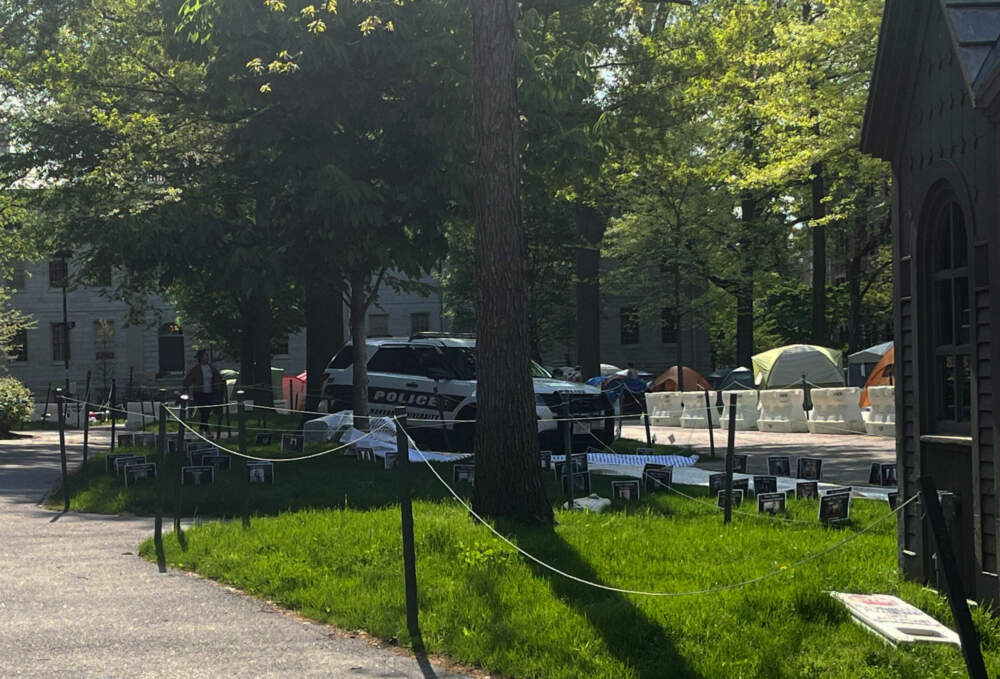Advertisement
Pro-Palestinian encampment ends at Harvard, but organizers say the protest isn't over

Student protesters at Harvard University voluntarily ended their pro-Palestinian encampment Tuesday morning.
The disbandment comes after nearly three weeks of student occupation in Harvard Yard, which organizers dubbed "The Harvard Liberated Zone."
Interim president Alan Garber and Hopi Hoekstra, dean of the faculty of arts and sciences, plan to meet with student protestors for further discussion regarding the war in Gaza, according to spokesman Jonathan Swain. Garber also plans to "pursue a meeting" between students and the Corporation Committee on Shareholder Responsibility related to the school's endowment.
In a Tuesday letter to the campus community, Garber said he will ask schools to "promptly initiate" reinstatement proceedings for students who had been placed on involuntary leave as a result of their involvement in the protest. In a May 6 letter, Garber said those placed on involuntary leave "may not be able to sit for exams, may not continue to reside in Harvard housing, and must cease to be present on campus until reinstated."
More than 20 students have been suspended and more than 60 were referred for additional disciplinary charges, according to organizers of the group Harvard Out of Occupied Palestine.
That coalition offered more insight into its decision to voluntarily disband in an Instagram post Tuesday morning. "Encampments are a tactic — a big and beautiful one — in a larger strategy of divestment," it wrote. "Here at Harvard, we believe the utility of this tactic has passed, and we have decided to re-group and carry out this protracted struggle through other means."

The group added that Harvard officials agreed to offer "meetings regarding disclosure and divestment with members of the Harvard Management Company," which runs the school's endowment, and to begin conversations around creating a Center for Palestinian Studies.
"We are under no illusions: we do not believe these meetings are divestment wins," the protest group added. In a statement, the group said it would continue to pursue a "long term strategy for winning divestment at Harvard."
"The end of the encampment marks the beginning of a new phase of our movement," it said.
The coalition voted to end the encampment on Monday, according to the statement.
By late morning Tuesday, most, if not all, of the tents in Harvard Yard appeared to have been taken down. Some students were packing items into cars. Those approached by a reporter declined to comment. There was minimal police presence, but some members of Harvard police could be seen standing nearby to oversee activity.
Advertisement
Around campus, some students weighed in on the end to the encampment and its impact on the community at large. Nicolas Pantelick, 23, a senior pursuing Middle Eastern Studies and political science, said he was glad it ended "mostly peacefully given the terrible scenes that were happening and playing out all over the country elsewhere."
"I think it was maybe an inevitability," Panetelick said of the end of the encampment, "but I guess it's hard to feel like the concessions they got from the university were that significant."
Adding that he had friends who were part of the encampment and had visited it several times, he described the camp as "overwhelmingly peaceful" with "lots of community-based activities, art-making workshops, teach-ins."
Not all Harvard affiliates shared that perspective. Rotem Spiegler, a 2019 Harvard Law graduate who was seen mounting a sign of a young Israeli hostage near the yard, said she would have felt better if the encampment "came down with some consequences and understanding and dialogue and education."
"They've been chanting and littering and disturbing life on campus for seven months basically," she said. "But this is like the peak of that and they just don't care about anyone." Spiegler added she felt the university's response to the protesters "is just helping this get louder and worst next semester because this is what they learn."
The end to the occupation of Harvard Yard brings a close to a wave of encampments on campuses across Boston and the state. Hundreds of student protesters at MIT, UMass Amherst, Emerson and Northeastern have faced arrests and discipline at their schools, as police were called in to clear out tents and forcibly detain people.
The move at Harvard also comes just days before its commencement on May 23, for which preparations have already begun. Since the beginning of the encampment 20 days ago, officials had locked the gates to Harvard Yard and required students and affiliates to show ID in order to access the area. The gates to the yard remained locked to members of the public on Tuesday.
In his letter to the Harvard community Tuesday, Garber said, "I acknowledge the profound grief that many in our community feel over the tragic effects of the ongoing war. There will continue to be deep disagreements and strongly felt emotions as we experience pain and distress over events in the wider world."
